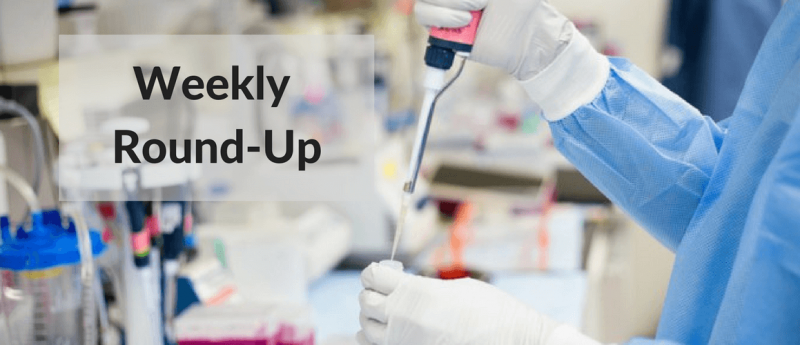Cell therapy weekly: FDA indicates more guidance is to come on cell therapy manufacture

This week: one-time gene therapy receives Breakthrough Designation and MSCs could improve efficacy of flu vaccine.
The news highlights:
FDA to release further guidance on gene and cell therapy clinical development
One-time gene therapy for cerebral adrenoleukodystrophy granted Breakthrough Therapy designation
Longeveron receives grant to improve flu vaccine responses with MSCs
Amendments accepts in gene-edited CAR-T trial for acute myeloid leukemia
FDA to release further guidance on gene and cell therapy clinical development
Speaking at the annual board meeting of the Alliance for Regenerative Medicine (DC, USA), FDA Commissioner Scott Gottlieb indicated that further direction was to come on the clinical development and manufacture of cell and gene therapies. He also commented that the agency may be willing to accept more uncertainty for some cell and gene therapies, particular those that had earnt a Regenerative Medicine Advanced Therapy designation.
“We’re at a key point when it comes to cell and gene therapy…but these approaches also present new challenges”, said Gottlieb. “FDA has more than 500 active investigational new drug applications involving gene therapy products…[and] we’re asking for new resources to greatly expand our capabilities for collecting post market data when it comes to new drugs.”
One-time gene therapy for cerebral adrenoleukodystrophy granted Breakthrough Therapy designation
bluebird bio, Inc. (MA, USA) has announced its gene therapy for cerebral adrenoleukodystrophy (CALD), a rare hereditary neurological disorder, has received Breakthrough Therapy designation from the FDA. Lenti-Dâ„¢ is based on modified, autologous hematopoietic stem cells and has been evaluated in boys under 17 years old who did not have a matched sibling donor.
“The founding of bluebird was inspired by the potential to develop a one-time gene therapy for boys suffering from this potentially fatal form of adrenoleukodystrophy,” said David Davidson, chief medical officer, bluebird bio. “We look forward to continuing to work closely with the FDA and EMA to expedite development of Lenti-D as a treatment for CALD.”
Longeveron receives grant to improve flu vaccine responses with MSCs
Longeveron LLC (FL, USA) has received US$750,000 from the Maryland Technology Development Corporation (TEDCO; MD, USA), which will be applied towards its clinical trial assessing the efficacy of allogeneic mesenchymal stem cells (MSCs) in improving the immune response to the flu vaccine in older patients. Longeveron’s MSCs are derived from the bone marrow of young, healthy donors.
“Last year’s flu season was one of the worst and deadliest in recent years, and seniors are typically the most vulnerable. Generally, people over 65 have the highest rate of hospitalization for flu. Regenerative stem cell therapies hold great promise to bolster the immune systems of older people for greater resistance to flu,” said Joshua Hare, Longeveron Co-Founder and Chief Science Officer.
“We are very excited about this great project to test Longeveron’s cells clinical capabilities in improving inflammation and immunity,” said Dan Gincel, Executive Director of the Maryland Stem Cell Research Fund. “This is an important test of cell therapy technology and may have long term implications in vaccine strategies in older adults.”
Amendments accepted in gene-edited CAR-T trial for acute myeloid leukemia
Protocol amendments have been accepted in Cellectis’ (NY, USA) trial for the UCART123 gene-edited allogeneic CAR-T cell-candidate in patients with acute myeloid leukemia (AML). Following the product’s safety and tolerability profile, dose level 1 has been increased to to 2.5×105 UCART123 cells per kilogram, with dose levels 2 and 3 now 6.25×105 and 5.05×106 respectively. The dose limiting toxicities observation period has been dropped from 42 to 28 days post-infusion in patients without aplastic bone marrow and a potential second infusion has been implemented.
“This amendment approval for Cellectis’ UCART123 protocol is an important step in the progression of our study, and opening another clinical site at MD Anderson puts the Company on solid ground to help as many AML patients as possible with this innovative new therapy,” said Stéphane Depil, Senior Vice President, R&D, and Chief Medical Officer at Cellectis.
“Off-the-shelf gene editing immunotherapy is continuing to revolutionize the landscape of modern medicine, and we hope that this approach leads to a lifesaving treatment for AML patients in the near future.”
For more weekly cell therapy news, read previous editions of the cell therapy weekly.